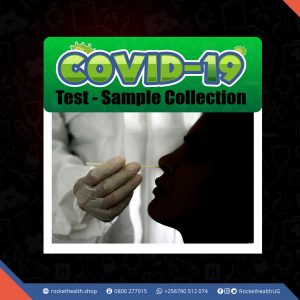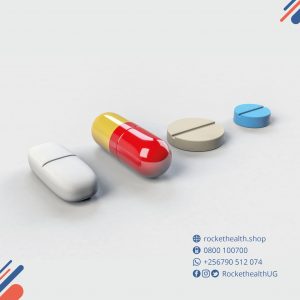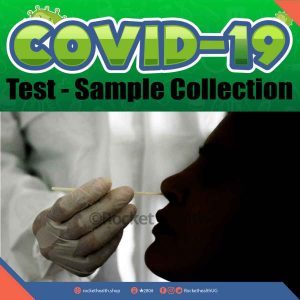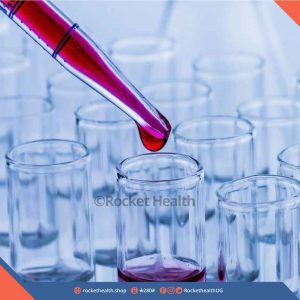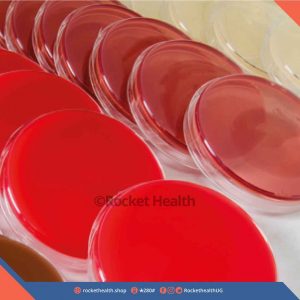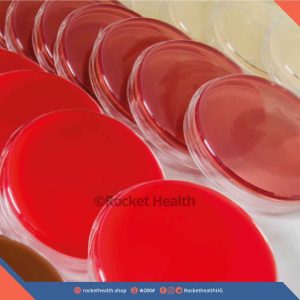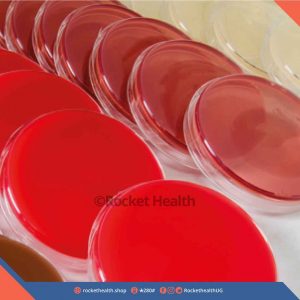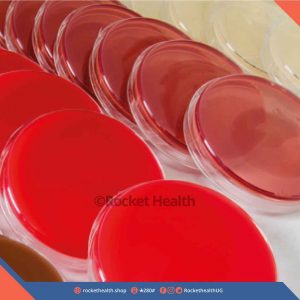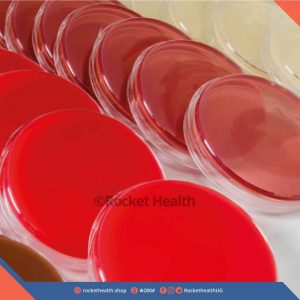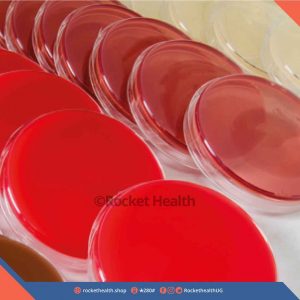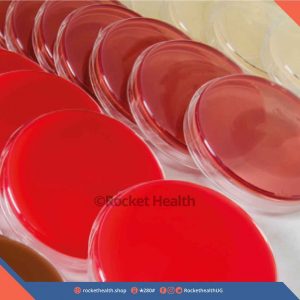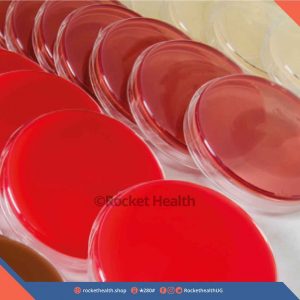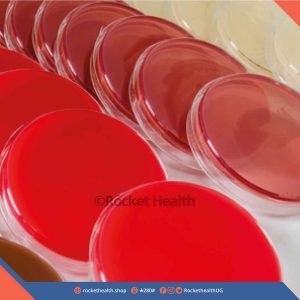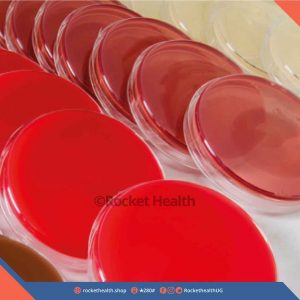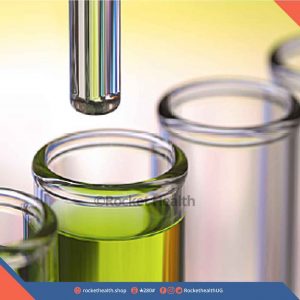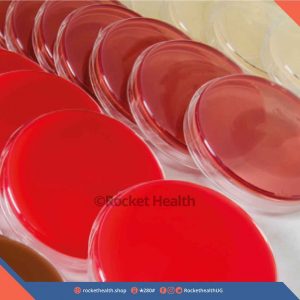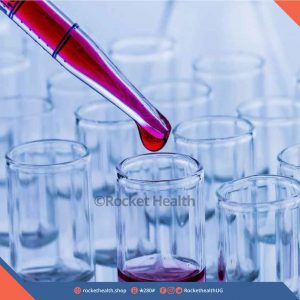No products in the cart.
-
Sexually Transmitted Infection (STI) Screening(Extended)
Tests Include:
- HIV Antibody screening
- Hepatitis B screening
- Syphilis Test
- Urinalysis
- Gonorhea Antibody
- Herpes antibody (IgG, IgM)
- Hepatitis C Screening
- Chlamydia Antibody
215,000UGX -
Lab Results Tele-Consultation
Lab Results Tele-Consultation is meant for customers who order lab tests services and want our rocket health doctors to call and explain for them the results.
10,000UGXLab Results Tele-Consultation
10,000UGX -
COVID-19 Antigen Test (Rapid) in Kampala
This is a rapid test used to screen for Covid 19 infection when experiencing the typical Covid19 symptoms such as runny nose, headaches, general weakness, sore throat, chest pain among others. Test results will be ready in 6 hours.
Rocket Health doctors will call to share results and give medical advise.
If one tests positive, one may choose to enroll onto our COVID-19 home-based care program.
40,000UGXCOVID-19 Antigen Test (Rapid) in Kampala
40,000UGX -
Mefloquine 250mg Mephaquin Tablets4’s
Mefloquine is an antimalarial used for the treatment of mild to moderate acute malaria caused by mefloquine-susceptible strains of P. falciparum (both chloroquine-susceptible and resistant strains) or by Plasmodium vivax. Mefloquine should be used with primaquine if the malarial illness is caused by P. vivax parasites.
55,000UGXMefloquine 250mg Mephaquin Tablets4’s
55,000UGX -
COVID-19 PCR Test in Kampala
Rocket Health is coordinating COVID-19 sample collection and having tests run in Kampala, Uganda by Ministry of Health accredited laboratories. Test results will be ready within 24 hours. This is the recommended test for international travel.
Rocket Health doctors will call to share test results and give medical advice.
If one tests positive, one may choose to enroll onto our COVID-19 home-based care program.
100,000UGXCOVID-19 PCR Test in Kampala
100,000UGX -
COVID-19 PCR Test in Kampala (Express)
Rocket Health is coordinating COVID-19 sample collection and having tests run by Ministry of Health accredited facilities. Test results will be ready in 12 hours.
Rocket Health doctors will call to share results and give medical advise.
If one tests positive, one may choose to enroll onto our COVID-19 home-based care program.
280,000UGXCOVID-19 PCR Test in Kampala (Express)
280,000UGX -
Thyroid- Stimulating Hormone (TSH)
This is a blood test that measures the amount of Thyroid Stimulating Hormone in the blood.
Blood.
If you take thyroid hormone as treatment for thyroid disease, it is recommended that your blood sample be drawn before you take your dose for that day. Acute illness may also affect thyroid testing results so it is generally recommended that thyroid testing be avoided in hospitalized patients. Inform the doctor if you are on any medications including multivitamins and supplements, have any allergies or underlying medical conditions before this test.
To help diagnose thyroid disorders and to monitor treatment of hypothyroidism and hyperthyroidism;sometimes a TSH test is used to screen newborns for congenital hypothyroidism.
45,000UGXThyroid- Stimulating Hormone (TSH)
45,000UGX -
Swab culture and sensitivity
A culture is a test to find the exact germs (such as bacteria or a fungus) that is causing an infection. A sensitivity test checks to see what kind of medicine, such as an antibiotic, will work best to treat the illness or infection.
Throat swab, Pus swab, Wound swab, Environmental swab.
Do not take antibiotics for atleast 3 days before the test.
A test that demonstrates the presence of disease causing organisms in the body. Culture and sensitivity demonstrates the presence of disease causing organisms in the body and to identify which medicines can best eliminate them. In this test, disease causing organisms (most commonly bacteria and fungi) are grown in the laboratory (cultured) and medicines tried on them to determine which ones best work on them (sensitivity testing).
60,000UGXSwab culture and sensitivity
60,000UGX -
Ascitic fluid culture and sensitivity
A culture is a test to find the exact germs (such as bacteria or a fungus) that is causing an infection. A sensitivity test checks to see what kind of medicine, such as an antibiotic, will work best to treat the illness or infection.
Ascitic fluid (abdominal fluid).
Do not take antibiotics for atleast 3 days before the test.
A test that demonstrates the presence of disease causing organisms in the body. Culture and sensitivity demonstrates the presence of disease causing organisms in the body and to identify which medicines can best eliminate them. In this test, disease causing organisms (most commonly bacteria and fungi) are grown in the laboratory (cultured) and medicines tried on them to determine which ones best work on them (sensitivity testing).
60,000UGXAscitic fluid culture and sensitivity
60,000UGX -
CSF Culture and sensitivity
A culture is a test to find the exact germs (such as bacteria or a fungus) that is causing an infection. A sensitivity test checks to see what kind of medicine, such as an antibiotic, will work best to treat the illness or infection.
Celebralspinal fluid (CSF).
Do not take antibiotics for atleast 3 days before the test.
A test that demonstrates the presence of disease causing organisms in the body. Culture and sensitivity demonstrates the presence of disease causing organisms in the body and to identify which medicines can best eliminate them. In this test, disease causing organisms (most commonly bacteria and fungi) are grown in the laboratory (cultured) and medicines tried on them to determine which ones best work on them (sensitivity testing).
100,000UGXCSF Culture and sensitivity
100,000UGX -
Pleural fluid culture and sensitivity
A culture is a test to find the exact germs (such as bacteria or a fungus) that is causing an infection. A sensitivity test checks to see what kind of medicine, such as an antibiotic, will work best to treat the illness or infection.
Pleural fluid (fluid in the chest).
Do not take antibiotics for atleast 3 days before the test.
A test that demonstrates the presence of disease causing organisms in the body. Culture and sensitivity demonstrates the presence of disease causing organisms in the body and to identify which medicines can best eliminate them. In this test, disease causing organisms (most commonly bacteria and fungi) are grown in the laboratory (cultured) and medicines tried on them to determine which ones best work on them (sensitivity testing).
60,000UGXPleural fluid culture and sensitivity
60,000UGX -
Sputum ZN, Gram stain + culture and sensitivity
A culture is a test to find the exact germs (such as bacteria or a fungus) that is causing an infection. A sensitivity test checks to see what kind of medicine, such as an antibiotic, will work best to treat the illness or infection.
Sputum.
Do not take antibiotics for atleast 3 days before the test.
A test that demonstrates the presence of disease causing organisms in the body. Culture and sensitivity demonstrates the presence of disease causing organisms in the body and to identify which medicines can best eliminate them. In this test, disease causing organisms (most commonly bacteria and fungi) are grown in the laboratory (cultured) and medicines tried on them to determine which ones best work on them (sensitivity testing).
70,000UGX -
High vaginal swab culture and sensitivity
A culture is a test to find the exact germs (such as bacteria or a fungus) that is causing an infection. A sensitivity test checks to see what kind of medicine, such as an antibiotic, will work best to treat the illness or infection.
Vaginal swab.
Do not take antibiotics for atleast 3 days before the test.
A test that demonstrates the presence of disease causing organisms in the body. Culture and sensitivity demonstrates the presence of disease causing organisms in the body and to identify which medicines can best eliminate them. In this test, disease causing organisms (most commonly bacteria and fungi) are grown in the laboratory (cultured) and medicines tried on them to determine which ones best work on them (sensitivity testing).
60,000UGX -
Stool analysis + Culture and sensitivity
A culture is a test to find the exact germs (such as bacteria or a fungus) that is causing an infection. A sensitivity test checks to see what kind of medicine, such as an antibiotic, will work best to treat the illness or infection.
Stool.
Do not take antibiotics for atleast 3 days before the test.
A test that demonstrates the presence of disease causing organisms in the body. Culture and sensitivity demonstrates the presence of disease causing organisms in the body and to identify which medicines can best eliminate them. In this test, disease causing organisms (most commonly bacteria and fungi) are grown in the laboratory (cultured) and medicines tried on them to determine which ones best work on them (sensitivity testing).
60,000UGXStool analysis + Culture and sensitivity
60,000UGX -
Blood culture and sensitivity (Anaerobic)
A culture is a test to find the exact germs (such as bacteria or a fungus) that is causing an infection. A sensitivity test checks to see what kind of medicine, such as an antibiotic, will work best to treat the illness or infection.
Blood.
Do not take antibiotics for atleast 3 days before the test.
A test that demonstrates the presence of disease causing organisms in the body. Culture and sensitivity demonstrates the presence of disease causing organisms in the body and to identify which medicines can best eliminate them. In this test, disease causing organisms (most commonly bacteria and fungi) are grown in the laboratory (cultured) and medicines tried on them to determine which ones best work on them (sensitivity testing).
82,000UGX -
Blood culture and sensitivity (Aerobic)
A culture is a test to find the exact germs (such as bacteria or a fungus) that is causing an infection. A sensitivity test checks to see what kind of medicine, such as an antibiotic, will work best to treat the illness or infection.
Blood.
Do not take antibiotics for atleast 3 days before the test.
A test that demonstrates the presence of disease causing organisms in the body. Culture and sensitivity demonstrates the presence of disease causing organisms in the body and to identify which medicines can best eliminate them. In this test, disease causing organisms (most commonly bacteria and fungi) are grown in the laboratory (cultured) and medicines tried on them to determine which ones best work on them (sensitivity testing).
72,000UGXBlood culture and sensitivity (Aerobic)
72,000UGX -
Urine culture and sensitivity
A culture is a test to find the exact germs (such as bacteria or a fungus) that is causing an infection. A sensitivity test checks to see what kind of medicine, such as an antibiotic, will work best to treat the illness or infection.
Urine.
Do not take antibiotics for atleast 3 days before the test.
A test that demonstrates the presence of disease causing organisms in the body. Culture and sensitivity demonstrates the presence of disease causing organisms in the body and to identify which medicines can best eliminate them. In this test, disease causing organisms (most commonly bacteria and fungi) are grown in the laboratory (cultured) and medicines tried on them to determine which ones best work on them (sensitivity testing).
60,000UGXUrine culture and sensitivity
60,000UGX -
Progesterone
This is a test used to help check for possible causes of infertility, monitor or detect a failing pregnancy as well as tracking fertility treatments.This measures progesterone levels in blood.
Blood.
None, however early morning samples are preferred and for women, the date of your last menstrual period or trimester of pregnancy should be noted.
After ovulation, a corpus luteum forms in the ovary at the site where the egg was released and begins to produce progesterone. This progesterone, supplemented by small amounts produced by the adrenal glands, stops endometrial growth and readies the uterus for the possible implantation of a fertilized egg. If fertilization does not occur, the corpus luteum degenerates, progesterone levels drop, and menstrual bleeding begins. If a fertilized egg is implanted in the uterus, the corpus luteum continues to produce progesterone, with the egg forming a trophoblast that produces human chorionic gonadotropin (hCG). After several weeks, the placenta replaces the corpus luteum as the main source of progesterone, producing relatively large amounts of the hormone throughout the rest of a normal pregnancy.While men have small amounts of progesterone in their blood, progesterone is usually not tested in men, unless specific adrenal diseases are suspected. Progesterone does not have an established role in males.
50,000UGXProgesterone
50,000UGX -
Vitamin D
This test measures the level of vitamin D in the blood to check for insufficiency or track supplement treatment progress. Vitamin D is a family of compounds that is essential for the proper growth and formation of teeth and bones.
Blood.
Inform the doctor if you are on any medications, have any allergies or underlying medical conditions before this test. Ask your healthcare practitioner or lab for specific instructions.
The main role of vitamin D is to help regulate blood levels of calcium, phosphorus, and (to a lesser extent) magnesium. Vitamin D is vital for the growth and health of bone; without it, bones will be soft, malformed, and unable to repair themselves normally, resulting in diseases called rickets in children and osteomalacia in adults. Vitamin D comes from two sources: endogenous(D3), which is produced in the skin on exposure to sunlight, and exogenous(D4), which is ingested in foods and supplements.
120,000UGXVitamin D
120,000UGX -
Vitamin B12
This test measures the amount of vitamin B12 in the blood. The body needs this B vitamin to make blood cells and to maintain a healthy nervous system.
Blood.
Inform the doctor if you are on any medications, have any allergies or underlying medical conditions before this test. Ask your healthcare practitioner or lab for specific instructions.
The main role of vitamin D is to help regulate blood levels of calcium, phosphorus, and (to a lesser extent) magnesium. Vitamin D is vital for the growth and health of bone; without it, bones will be soft, malformed, and unable to repair themselves normally, resulting in diseases called rickets in children and osteomalacia in adults. Vitamin D comes from two sources: endogenous(D3), which is produced in the skin on exposure to sunlight, and exogenous(D4), which is ingested in foods and supplements.
60,000UGXVitamin B12
60,000UGX












